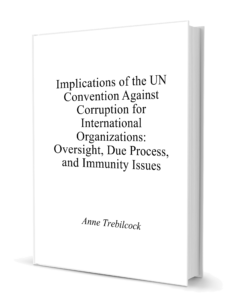
Anne Trebilcock
Read PDFRead PDFWhile public international organizations share the aspirations and values behind the United Nations Convention against Corruption (UNCAC), the way in which this instrument is being followed up may pose some practical challenges for them. The Convention mentions such organizations and their officials, but in the context of an instrument whose logic is overwhelmingly directed towards States. In the course of UNCAC implementation review, some unfortunate confusion has arisen between administrative justice and criminal jurisdiction, and around the privileges and immunities regime for international organizations. At the same time, follow-up to the Convention may offer new opportunities for such organizations to strengthen their alignment of responsibility, authority and accountability through so far underutilized means of coordination and cooperation. Strengthening accountability mechanisms and respect for due process – two components of the Global Administrative Law approach – offer the best prospects for enhancing international organizations’ efforts against corruption. An exaggerated focus on transparency, on the other hand, could run counter to effective measures to combat it.

